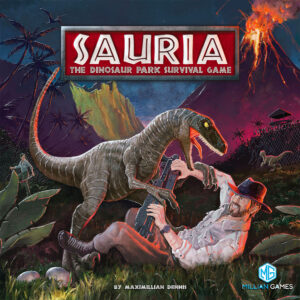 Over the last few years, I’ve had a bit of an obsession with dinosaur-themed games. I got Dinosaur World back in 2020, Holotype this year, and also backed PaleoVet. I viewed it as a bit of a pseudo trilogy, going from discovering dino types, to resurrecting them and building a park, to finally caring for them after said park collapses.
Over the last few years, I’ve had a bit of an obsession with dinosaur-themed games. I got Dinosaur World back in 2020, Holotype this year, and also backed PaleoVet. I viewed it as a bit of a pseudo trilogy, going from discovering dino types, to resurrecting them and building a park, to finally caring for them after said park collapses.
It was recently that I realized that there was a step missing in that loose chronology: the park breaking down and eating the tourists… er, the dinosaurs escaping. Enter Sauria, filling that niche, and supplying a cooler dinosaur theme! It is a game for 1-5 players, and is a lengthier game, coming in between 60 minutes and two hours. The best experience is with 3 or more players.
Gameplay Overview:
Think Jurassic Park without using the words Jurassic Park, and you should get some idea of what you can expect from this game. Each player takes one of eight character roles, some of which will seem very on-the-nose if you keep that thematic idea in mind: the paleontologist, the hunter, the scientist, the photographer, the saboteur, the ranger, the counselor, and the mathematician (sorry, chaotician, chaotician…). Played over the course of 16 rounds, the game is semi-cooperative, in that you need to make the necessary repairs to the island’s infrastructure in order to escape, which can be a team effort, but ultimately you are also trying to complete objectives to score VP. The winner is whoever manages to escape with the most VP.
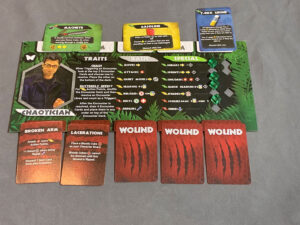
The game lasts for 16 rounds, and each round is composed of 4-5 phases, starting off with an event phase that affects all players during the round (with a bit of variety due to the day/night cycle over the course of the game). For the second half of the game, the island’s volcano will erupt at this point as well, causing additional chaos, but for the first eight rounds, you get a reprieve.
These first two steps are mostly wrenches getting thrown into whatever plans you might have had in mind. Following these two phases which are largely outside your control, is the accurately named Action phase, in which each player takes a turn spending three Action points to do various tasks: moving, using items, interacting with buildings, etc… Wherever the action you are performing is shown, it will list a number of action points between 1 and 3. If you’re doing the math already that means that, yes, over the course of the game you only have 48 Action Points (and fewer actions, since some cost more than one point!) over the course of the entire game.
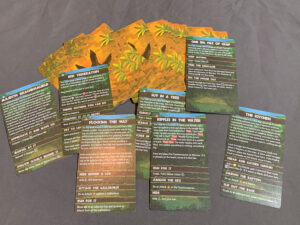
Actions can also have consequences. A large part of the game is the Noise mechanic. Many of the actions you can perform or places you can go on the board cause you to make noise, which in a park full of dangerous (and some not-so-dangerous) dinosaurs, is perhaps not the best idea. Whenever you make noise, you draw a number of Noise cubes out of the appropriate bag. If the cubes are all black, you are safe. If you draw a red cube, you have attracted the attention of the dinosaurs, and one appears, which can be bad for you. After all the players have taken their actions, there is a Dinosaur phase when the Dinosaurs will move and attack per a priority list that looks a little daunting but is ultimately simple. If you have the misfortune of sharing a space with a carnivore, yes, it will try to eat you. Following this Dinosaur phase, the round wraps up with just a small Clean Up phase to prepare for the next round. Then, just repeat the process 15 more times!
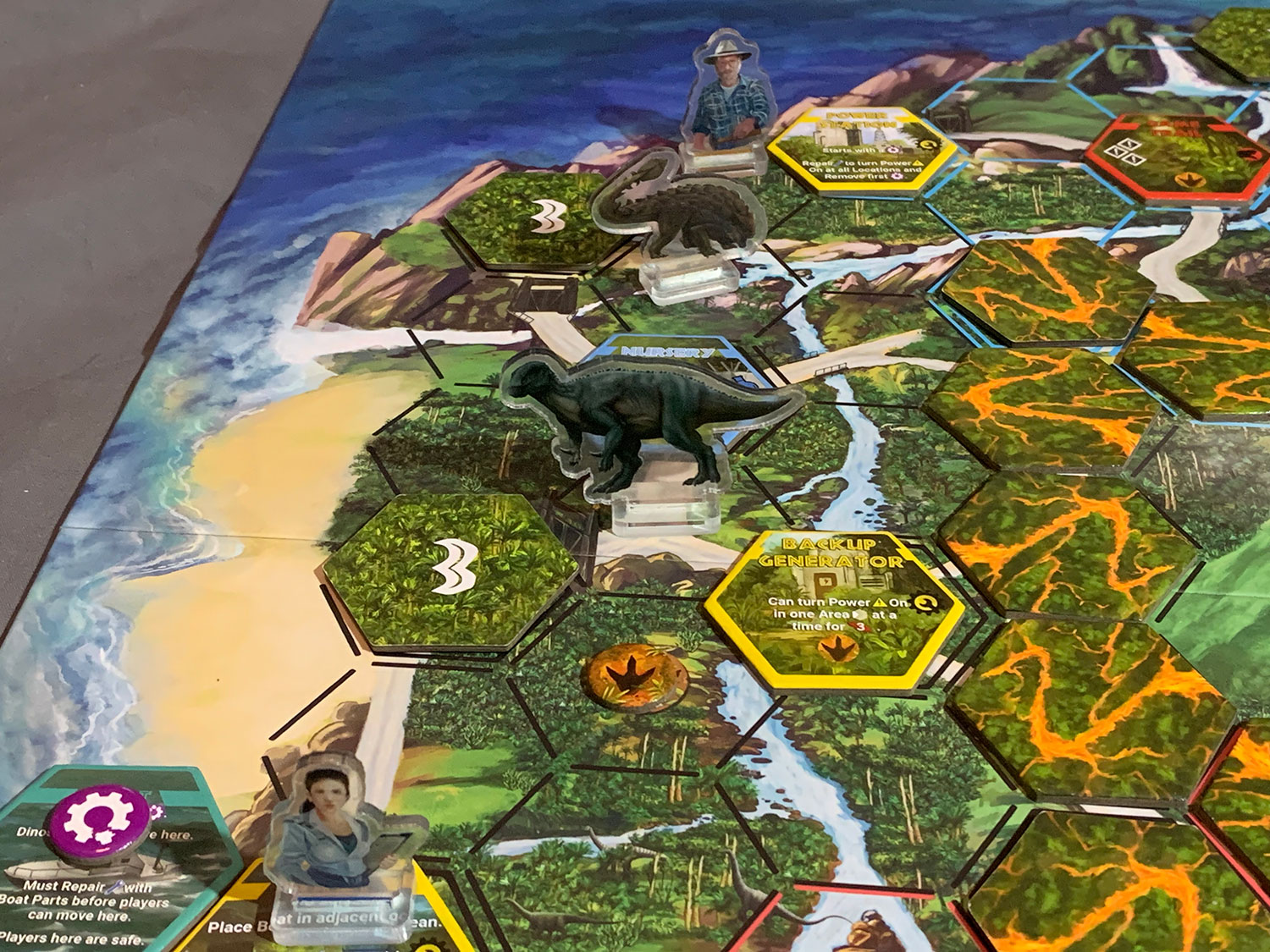
Game Experience:
All of the player decisions are relegated to the Action phase. None of the things you can do are particularly complicated. The challenge is that there are a lot of things to do, and a very limited amount of time to do them, so your decisions have to be made with that in mind. Plus the game does introduce a lot of chaos (Malcolm would be proud) that has dinosaurs and lava messing with your plans when you most want to avoid them. This is at times frustrating and charming (sometimes at the same time).
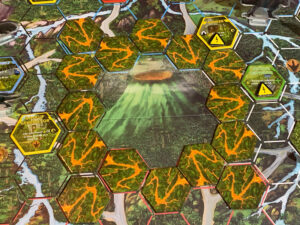
In order to achieve your goal of surviving the island, you have to move around the board to discover the various location tiles that represent important buildings or other sites of interest, such as the Bunker, the Raptor Nest, or the Helipad. There are 24 in all, with the more dangerous (but often useful) ones towards the outside of the island. In order to survive, you either need to get power to the distress signal (to alert the helicopter and escape by air), locate parts to repair the boat (to escape by sea), or find and restore power to the Bunker before the volcano destroys it (to hide there till help arrives). Since the locations are hidden from you at the start, and your Action points are limited, working together is almost crucial.
In addition to this overall goal of trying to survive the island, you want to collect Victory Points, many of which will be Personal Objectives specific to your character. Each character has three objective cards, of which you will have one each game. The one you have is secret information, so the other players will never know exactly what your VP goals are going to be each game (though if they’re familiar with the game, of course, they might be able to guess). Each card has four objectives, ranging from very easy to “I might die trying to do this.” Naturally, the harder ones are worth more VP. If you have a particularly hard objective, you do have other options. There are also ways to have Encounters throughout the game (primarily at specific spots on the island), and some of those have options to give you additional VP. Of course, those can also do things like have you place the T-Rex on your hex so… have fun.
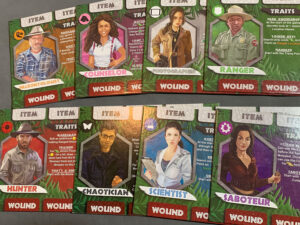
In the course of the game, you will invariably encounter carnivores, including large ones like the T-Rex or Spinosaurus. Some of them can be pretty lethal, but you do have a good buffer. As you take damage, you get facedown Wound cards across your player board until it is full, and then you start flipping them face up instead, suffering debilitating effects. Once all are flipped face up, you die. As you have five slots for Wound cards, you can take 10 damage before dying. That can go pretty quickly, but not instantly, so you do have chances to hide, run, or fight back (some roles will prefer the last option if possible).
There is a pretty decent amount of player interaction here, due to the need to be working together to a degree in order for anyone to be able to survive. It is not all positive though. In particular, the saboteur has some Personal Objectives that can set everyone back a bit. Carnivores will also hunt the closest player, so you needn’t outrun them, just outrun your fellow players (sacrificing another player to a Raptor pack is player interaction right?).
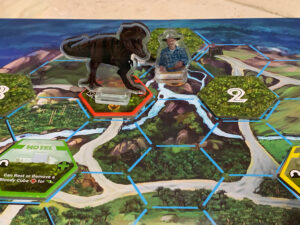
There is also a fully cooperative mode at the back of the rulebook, it functions largely like the normal version of the game, but without actively competing. I had mixed feelings about it because you are still working on completing goals for Victory Points, with a win being ending the game with VP equal to three times the player count (e.g., 24 in a 3-player game) with everyone surviving. It is technically a fully cooperative mode, which eliminates some of the issues I have with semi-cooperative in general, but it largely felt like an afterthought to me, unfortunately.
My biggest concern was with the semi-cooperative nature of the game. Being semi-cooperative feels like a game is trying to straddle both sides of the line, and ending up short as a result. Given the theme, I think that a fully cooperative game as the basic form of the game would have been appropriate, with some form of competition as a variant. It feels more right for the theme, and I think it would be a bit more straightforward. It seems that the expansion is introducing a fully-fledged and unique cooperative mode, so while it would have been nice to see that out-of-the-box, that it has been considered is good to see.
Final Thoughts:
I think what this game does very well is the theme. The references to Jurassic Park are not subtle. Some of the roles were artistically inspired by their Jurassic Park counterparts (the Chaotician is clearly a young Jeff Goldblum). The Encounter cards and character abilities are replete with quotes and references. A fan of Jurassic Park will see many little things to enjoy here. It is one of the most unabashedly Jurassic Park games I’ve seen (Dinosaur World being more akin to Jurassic World).
As far as the actual gameplay, the limitations you have are both a blessing and a curse. Your decisions feel meaningful, but that also gives you little margin for error. That can be good, as it does give the game tension. The final result is not a foregone conclusion. That tension can get to be a little much, as you are starting from almost zero information about where to go to complete the game’s objectives, and if you keep going the wrong way that margin of error wears thin. Then, of course, there is also the highly random nature of Noise, the Encounters, and the volcano. Some element of randomness is useful so that a game does not get too predictable, but the chaos that can ensue at times can be a little frustrating. Some might love that, some might hate it. It is a big part of the game, so it’s important to keep it in mind.
It’s one I’d be happy to use to expand to a dinosaur board game tetralogy, and am interested to see the fully cooperative expansion.
Final Score: 3.5 Stars – A thematically on-point game with solid mechanics, but could put some off with its inherent chaos. Held back a bit by not fully embracing a cooperative ruleset.
 Hits:
Hits:
• Incredibly well-done theme.
• Player decisions feel meaningful.
• Various roles, objectives, and random elements provide variety.
• Dinosaurs. Anything with dinosaurs is a win.
Misses:
• The semi-cooperative feels off with the theme, while the fully cooperative mode doesn’t feel fully realized.
• So much chaos. This could be a plus for some, but… so much chaos.
• The number of options and limited time can feel too overwhelming at times.
Source: Board Game Quest





